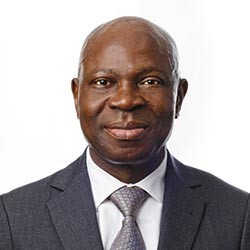World Bank/IMF Spring Meetings Accelerating Action for Food Security and Resilience, FARM Event Statement by Gilbert F. Houngbo President IFAD
IFAD Asset Request Portlet
Asset Publisher
World Bank/IMF Spring Meetings Accelerating Action for Food Security and Resilience, FARM Event Statement by Gilbert F. Houngbo President IFAD
21 April 2022Check against delivery
At a time when the world is being hit by what seems to be an endless series of shocks – from COVID to climate change, and conflict -- we must take collective action to build the resilience of the world’s poorest and most vulnerable. The impacts of the war in Ukraine underscore this significantly. While the world is coming together on the macro level with development assistance and humanitarian aid, we must not overlook the importance of long-term investments at the local, micro, level.
It is critical that investments in food security and resilience reach and benefit the world’s neediest people, and let me recall, again, that 80 per cent of the extreme poor live in rural areas.
We must also ensure that the pledges made at the Food Systems Summit and COP 26 become a reality on the ground. IFAD is pleased to be working with the World Bank, following last year’s Food Systems Summit, to plan how we can collectively mobilise the financial resources needed for this ambitious transformation of food systems.
I welcome the recent announcements to create the Resilience and Sustainability Trust in the IMF and the World Bank’s response and would encourage governments to consider allocating Special Drawing Rights to IFIs to finance the needs of agricultural transformation and the safeguarding of the livelihoods of the rural poor.
In this context, the Food and Agriculture Resilience Mission, launched by the EU and AU Presidents, promises to be transformative.
There is great potential to reduce poverty, improve food security, and build resilience to future shocks though Pillar 3 of the Initiative. Focusing on longer-term investments that foster resilient economies and food systems by increasing in local production and encouraging its consumption, developing regional and national markets, and reducing food waste and loss.
Historically, IFAD has been focusing exclusively on investing in last-mile agricultural development and is pleased to lead this Pillar 3 initiative.
But transforming Africa’s food systems requires a significant scaling up of capital investments, while also ensuring they truly benefit the most disadvantaged and leave no one behind.
It also requires commitment, by donors and recipient nations alike, to make sure sufficient resources are dedicated to transforming food systems.
When we look at the impacts of the war in Ukraine, and the many other shocks to food security we face – truly achieving resilience and making progress on the Sustainable Development Goals will require that these initiatives all converge. It will also require coordination from development institutions to ensure a systematic approach where each key actor leverages their comparative advantage.
IFAD looks forward to working with you to ensure food systems are more productive, resilient and sustainable, so that when the next shock strikes, it does not drive more people into poverty and hunger.
